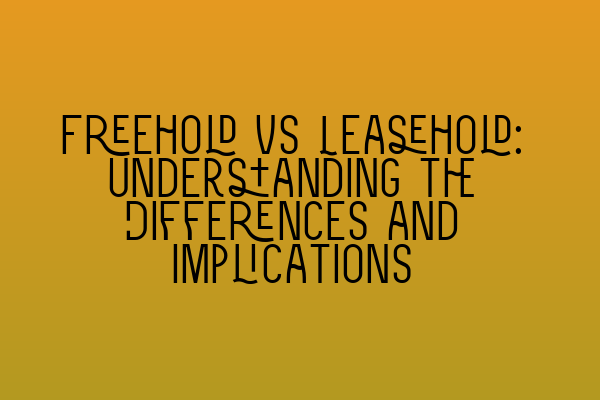Freehold vs Leasehold: Understanding the Differences and Implications
When it comes to buying and owning property, understanding the differences between freehold and leasehold is crucial. These terms refer to the types of ownership rights and responsibilities associated with a property. In this blog post, we will explore the distinctions between freehold and leasehold, their implications for property owners, and why it is important to seek legal advice from professionals like SQE Property Law & Land Law.
Freehold Ownership: Complete Control and Ownership
Let’s begin with freehold ownership. Simply put, if you own a property on a freehold basis, you have complete control and ownership of both the land and the buildings on it. You hold the title deeds to the property and have the right to use, modify, and dispose of the property as you see fit. This means you have the freedom to make changes to the property, such as extensions or renovations, without seeking permission from anyone else.
One of the key advantages of freehold ownership is that you don’t have to worry about paying ground rent or service charges. Moreover, you have the potential for long-term financial gains, as the property may appreciate in value over time.
However, freehold ownership also comes with certain responsibilities. As the owner, you are responsible for the maintenance and repair of the property, which can sometimes be costly. It is important to consider these factors before purchasing a freehold property.
Leasehold Ownership: Limited Rights and Obligations
In contrast, leasehold ownership involves a different set of rights and obligations. When you own a property on a leasehold basis, you are essentially purchasing the right to occupy the property for a specified period of time, as set out in a lease agreement with the freeholder.
Typically, leasehold ownership is more common for apartments and flats where multiple units share communal areas. The freeholder is usually responsible for maintaining the common areas and may charge a ground rent and service charges to cover these costs. It is important to carefully review the terms of the lease agreement and understand any additional costs associated with leasehold ownership.
Leasehold ownership has certain limitations compared to freehold. You may require permission from the freeholder to make alterations or modifications to the property, and there may be restrictions on subletting the property or running a business from it. At the end of the lease term, ownership of the property reverts to the freeholder unless the lease is extended.
Seeking Legal Advice from SQE Property Law & Land Law
Whether you are considering purchasing a freehold or leasehold property, it is crucial to seek professional legal advice. SQE Property Law & Land Law has a team of experienced solicitors who specialize in property law and can provide you with expert guidance throughout the process.
As an SEO expert at SQE Property Law & Land Law, I understand the importance of incorporating relevant keywords. However, our primary aim is to provide you with clear and concise information to help you understand the differences between freehold and leasehold ownership.
If you would like to learn more about SQE 1 practice exam questions, SQE 1 practice mocks FLK1 FLK2, SQE 2 preparation courses, SQE 1 preparation courses, or SRA SQE exam dates, please feel free to check out our related articles. Our team is committed to assisting you in navigating the complexities of property law and making informed decisions regarding your property ownership.
In conclusion, freehold and leasehold ownership each have their own merits and considerations. Understanding the differences between freehold and leasehold is essential when buying or owning a property. Consulting with experts like SQE Property Law & Land Law ensures that you receive the necessary advice and support to make sound decisions regarding property ownership.
